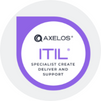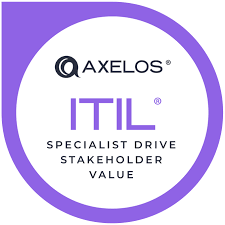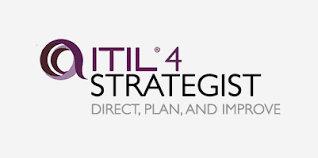
The ITIL® 4 Foundation training course provides a comprehensive introduction to IT Service Management through the ITIL framework. It covers key concepts, principles, and practices for delivering value to customers and stakeholders. Ideal for IT professionals and those seeking to enhance their service management skills, this course prepares participants for the ITIL® 4 Foundation certification exam, emphasizing practical applications and real-world scenarios.
ITIL® 4 Foundation Interview Questions Answers - For Intermediate
1. What is ITIL®?
ITIL® stands for Information Technology Infrastructure Library, a set of best practices for IT service management (ITSM).
2. What are the key components of ITIL® 4?
The key components are the Service Value System (SVS), the Four Dimensions of Service Management, the Guiding Principles, and the ITIL® Practices.
3. What is the purpose of the Service Value System (SVS)?
The SVS provides a holistic approach to service management, integrating various components to create value for customers and stakeholders.
4. Explain the concept of the Four Dimensions of Service Management.
The Four Dimensions of Service Management represent the perspectives that need to be considered when delivering services: Organizations and People, Information and Technology, Partners and Suppliers, and Value Streams and Processes.
5. What are the Guiding Principles in ITIL® 4?
The Guiding Principles are a set of recommendations that guide an organization in all circumstances, regardless of changes in its goals, strategies, type of work, or management structure.
6. How do you ensure continual improvement in ITIL® 4?
Continual improvement is achieved by regularly assessing services, processes, and practices, identifying areas for improvement, and implementing changes to enhance value delivery.
7. What is the role of the Change Control process in ITIL® 4?
The Change Control process ensures that all changes to the IT environment are assessed, authorized, and implemented in a controlled manner to minimize the impact on services.
8. What is the purpose of the Incident Management process?
The Incident Management process aims to restore normal service operation as quickly as possible after an incident, minimizing the impact on business operations.
9. Differentiate between a Problem and an Incident.
An Incident is an unplanned interruption to a service or a reduction in the quality of a service, while a Problem is the underlying cause of one or more Incidents.
10. Explain the concept of Service Level Management.
Service Level Management is responsible for negotiating, documenting, and monitoring the levels of service agreed upon with customers and ensuring that these service levels are met.
11. What is the purpose of the Service Catalog in ITIL® 4?
The Service Catalog provides a central repository of information about IT services, including service descriptions, service levels, and pricing, to help customers understand available services.
12. How does ITIL® 4 support DevOps practices?
ITIL® 4 promotes collaboration and integration between development and operations teams, enabling faster and more reliable delivery of services through practices such as continual feedback and automation.
13. What is the role of the Service Desk in ITIL® 4?
The Service Desk serves as a single point of contact between users and the IT organization, handling incidents, service requests, and inquiries, and facilitating communication throughout the service lifecycle.
14. Explain the concept of Value Co-creation in ITIL® 4.
Value Co-creation emphasizes the collaborative efforts of service providers and service consumers in jointly creating value through the use of services, resources, and capabilities.
15. How does ITIL® 4 address the management of risks and opportunities?
ITIL® 4 integrates risk management practices into service management processes, enabling organizations to identify, assess, and respond to risks and opportunities effectively.
16. What are the key benefits of adopting ITIL® 4 practices?
Key benefits include improved service quality, enhanced customer satisfaction, increased operational efficiency, and better alignment of IT with business objectives.
17. How do you measure the success of ITIL® 4 implementation?
Success can be measured through key performance indicators (KPIs) such as service availability, incident resolution time, customer satisfaction scores, and adherence to service level agreements (SLAs).
18. Explain the concept of a Service Owner in ITIL® 4.
A Service Owner is responsible for the overall management and performance of a specific service throughout its lifecycle, including strategy, design, transition, operation, and continual improvement.
19. How does ITIL® 4 address the management of knowledge and information?
ITIL® 4 emphasizes the importance of knowledge management practices in capturing, storing, sharing, and using information to support decision-making and improve service delivery.
20. What are the key challenges organizations may face when implementing ITIL® 4 practices?
Challenges include resistance to change, lack of senior management support, complexity of implementation, integration with existing processes, and ensuring ongoing commitment to continual improvement.
ITIL® 4 Foundation Interview Questions Answers - For Advanced
1. Can you explain the key differences between ITIL v3 and ITIL 4?
ITIL v3 and ITIL 4 differ significantly in their approach to IT service management. ITIL v3 is process-driven and focuses on the lifecycle of services, divided into five stages: Service Strategy, Service Design, Service Transition, Service Operation, and Continual Service Improvement. Each stage contains specific processes and guidelines for managing IT services effectively.
In contrast, ITIL 4 is more flexible and holistic, adopting a value-driven approach. It introduces the Service Value System (SVS), which integrates various components and activities to create value through IT services. ITIL 4 emphasizes principles such as collaboration, feedback, and continual improvement, with a strong focus on co-creating value with stakeholders. Additionally, ITIL 4 incorporates modern methodologies like Agile, Lean, and DevOps to align with current industry practices.
2. How does ITIL 4 integrate with Agile, Lean, and DevOps practices?
ITIL 4 integrates with Agile, Lean, and DevOps by aligning its principles with the core values and practices of these methodologies. Agile focuses on iterative development, customer collaboration, and responding to change. ITIL 4 supports these principles through its emphasis on flexibility, collaboration, and continual improvement, enabling organizations to adopt Agile practices within the ITIL framework.
Lean aims to eliminate waste and improve efficiency. ITIL 4 promotes Lean principles by encouraging the optimization of processes, reduction of non-value-adding activities, and continuous improvement to enhance service delivery and customer satisfaction.
DevOps emphasizes the collaboration between development and operations teams to accelerate delivery and improve quality. ITIL 4 aligns with DevOps by fostering a culture of collaboration, integrating feedback loops, and promoting practices such as continuous integration and continuous deployment (CI/CD). ITIL 4’s holistic approach ensures that IT service management supports and enhances the effectiveness of Agile, Lean, and DevOps practices.
3. What are the guiding principles of ITIL 4, and how do they influence service management?
The guiding principles of ITIL 4 are central to its framework, influencing how organizations approach service management. These principles are:
- Focus on Value: Everything the organization does should link back to value for customers and stakeholders.
- Start Where You Are: Assess the current state and use existing resources and capabilities effectively.
- Progress Iteratively with Feedback: Use an iterative approach to make gradual improvements, incorporating feedback at every step.
- Collaborate and Promote Visibility: Encourage collaboration across the organization and ensure transparency in processes and decision-making.
- Think and Work Holistically: Consider the entire organization and its interdependencies, rather than working in silos.
- Keep It Simple and Practical: Simplify processes and avoid unnecessary complexity.
- Optimize and Automate: Continually optimize processes and leverage automation to improve efficiency and effectiveness.
These principles guide organizations in creating a value-driven, collaborative, and efficient service management environment, ensuring that all activities align with the organization’s goals and customer needs.
4. How can the ITIL 4 Service Value Chain improve service delivery?
The ITIL 4 Service Value Chain (SVC) is a key component of the Service Value System (SVS), designed to enhance service delivery by providing a structured approach to managing activities and resources. The SVC consists of six activities: Plan, Improve, Engage, Design and Transition, Obtain/Build, and Deliver and Support. These activities are interconnected and can be combined in various ways to create value streams tailored to specific services and processes.
The SVC improves service delivery by:
- Ensuring Alignment: Each activity is aligned with the organization’s objectives and customer needs, ensuring that all efforts contribute to value creation.
- Enhancing Collaboration: The interconnected nature of the SVC promotes collaboration across different functions and teams, breaking down silos and fostering a unified approach to service management.
- Facilitating Continuous Improvement: By integrating continual improvement into every activity, the SVC ensures that services and processes are regularly evaluated and enhanced, leading to better performance and outcomes.
- Increasing Flexibility: The SVC allows organizations to adapt their value streams based on changing business requirements, enabling a more agile and responsive service delivery model.
5. What role does governance play in the ITIL 4 framework?
Governance is a critical component of the ITIL 4 framework, ensuring that the organization’s IT services and processes align with its overall strategy, policies, and objectives. In ITIL 4, governance encompasses the following key activities:
- Evaluating: Assessing the organization’s current and future needs, risks, and opportunities to ensure that IT services align with business goals.
- Directing: Setting the direction for IT service management, establishing policies, strategies, and decision-making frameworks to guide the organization’s activities.
- Monitoring: Continuously reviewing performance, compliance, and outcomes to ensure that IT services meet the desired objectives and adhere to established policies.
Governance in ITIL 4 ensures that all activities within the Service Value System (SVS) are controlled and managed effectively, providing oversight and accountability. It helps organizations achieve strategic alignment, manage risks, and ensure compliance with regulatory and legal requirements, ultimately enhancing the quality and reliability of IT services.
6. Can you discuss the importance of the Continual Improvement model in ITIL 4?
The Continual Improvement model in ITIL 4 is fundamental to enhancing service quality, efficiency, and effectiveness. It provides a structured approach for identifying and implementing improvements across the organization. The model consists of the following steps:
- What is the Vision?: Define the strategic objectives and goals that align with the organization’s vision.
- Where Are We Now?: Assess the current state of services, processes, and performance to identify gaps and areas for improvement.
- Where Do We Want to Be?: Set measurable targets and define the desired future state.
- How Do We Get There?: Develop a plan with specific actions and initiatives to achieve the desired improvements.
- Take Action: Implement the improvement initiatives, ensuring they are aligned with the plan.
- Did We Get There?: Evaluate the outcomes to determine if the improvements have met the defined targets.
- How Do We Keep the Momentum Going?: Embed a culture of continuous improvement within the organization, ensuring ongoing evaluation and enhancement of services and processes.
The continuous improvement model is essential for maintaining high standards of service delivery, fostering innovation, and ensuring that the organization can adapt to changing business needs and technological advancements.
7. What are the critical success factors for implementing ITIL 4 in an organization?
Implementing ITIL 4 successfully in an organization requires several critical success factors:
- Executive Support: Strong commitment and support from senior management are crucial to drive the adoption and integration of ITIL 4 principles and practices.
- Clear Vision and Objectives: Establishing a clear vision and specific objectives ensures that all efforts are aligned with the organization’s strategic goals and customer needs.
- Effective Communication: Transparent and continuous communication helps in managing change, addressing concerns, and ensuring that all stakeholders understand the benefits and goals of ITIL 4 implementation.
- Training and Education: Providing adequate training and resources enables employees to understand and apply ITIL 4 concepts effectively, fostering a culture of continual improvement.
- Tailored Approach: Customizing the ITIL 4 framework to fit the organization’s specific context, needs, and existing processes ensures better integration and acceptance.
- Collaboration and Involvement: Encouraging collaboration across different functions and involving key stakeholders in the implementation process helps in breaking down silos and promoting a unified approach.
- Measurement and Metrics: Establishing clear metrics and KPIs to monitor progress and evaluate the effectiveness of ITIL 4 implementation ensures that improvements can be measured and managed.
8. How does ITIL 4 address the challenges of digital transformation?
ITIL 4 addresses the challenges of digital transformation by providing a flexible and holistic framework that supports organizations in adapting to rapid technological changes and evolving customer expectations. Key ways ITIL 4 addresses these challenges include:
- Emphasizing Agility: ITIL 4 incorporates Agile principles, enabling organizations to respond quickly to changes and deliver value more rapidly.
- Promoting Collaboration: By fostering a culture of collaboration across different teams and functions, ITIL 4 helps organizations break down silos and work together effectively in a digital environment.
- Integrating Modern Practices: ITIL 4 integrates practices such as DevOps and Lean, which are essential for successful digital transformation, ensuring that IT service management aligns with contemporary methodologies.
- Focus on Value: ITIL 4’s value-driven approach ensures that all activities and processes are aligned with delivering value to customers and stakeholders, a critical aspect of digital transformation.
- Service Value System (SVS): The SVS provides a comprehensive framework that integrates various components and activities, enabling organizations to manage digital services effectively and create value.
- Adaptability: ITIL 4’s flexible framework allows organizations to tailor their approach to fit specific digital transformation goals, ensuring that IT service management supports and enhances digital initiatives.
9. What is the role of the ITIL 4 Practitioner in an organization?
The ITIL 4 Practitioner plays a vital role in implementing and promoting ITIL 4 practices within an organization. Their responsibilities include:
- Applying ITIL Principles: Practitioners are responsible for applying ITIL 4 guiding principles and best practices to improve service management processes and deliver value to customers and stakeholders.
- Facilitating Collaboration: They promote collaboration across different teams and functions, ensuring that all stakeholders are aligned and working towards common goals.
- Driving Continual Improvement: Practitioners lead initiatives for continual improvement, identifying areas for enhancement and implementing changes to optimize processes and services.
- Supporting Digital Transformation: They play a key role in supporting digital transformation efforts by integrating ITIL 4 practices with modern methodologies such as Agile, Lean, and DevOps.
- Ensuring Compliance: Practitioners ensure that IT service management activities comply with organizational policies, standards, and regulatory requirements.
- Measuring and Reporting: Practitioners monitor performance, measure outcomes, and report on the effectiveness of ITIL 4 implementation, providing insights and recommendations for further improvements.
10. How can organizations measure the success of ITIL 4 implementation?
Organizations can measure the success of ITIL 4 implementation through various metrics and KPIs that evaluate the impact on service management processes and overall business performance. Key measures include:
- Customer Satisfaction: Regularly gathering feedback from customers and measuring satisfaction levels to assess the quality of service delivery.
- Service Performance Metrics: Monitoring key performance indicators (KPIs) such as incident resolution time, service availability, and response times to evaluate the efficiency and effectiveness of IT services.
- Business Outcomes: Assessing the alignment of IT services with business objectives and measuring the impact on business performance, such as increased revenue, reduced costs, and improved productivity.
- Process Efficiency: Evaluating the efficiency of service management processes by measuring factors such as process cycle times, resource utilization, and the number of process improvements implemented.
- Compliance and Risk Management: Ensuring that IT service management activities comply with organizational policies, standards, and regulatory requirements, and measuring the effectiveness of risk management practices.
By using these measures, organizations can gain a comprehensive understanding of the effectiveness of ITIL 4 implementation and identify areas for further improvement.
Course Schedule
| Apr, 2025 | Weekdays | Mon-Fri | Enquire Now |
| Weekend | Sat-Sun | Enquire Now | |
| May, 2025 | Weekdays | Mon-Fri | Enquire Now |
| Weekend | Sat-Sun | Enquire Now |
Related Courses
Related Articles
Related Interview
Related FAQ's
- Instructor-led Live Online Interactive Training
- Project Based Customized Learning
- Fast Track Training Program
- Self-paced learning
- In one-on-one training, you have the flexibility to choose the days, timings, and duration according to your preferences.
- We create a personalized training calendar based on your chosen schedule.
- Complete Live Online Interactive Training of the Course
- After Training Recorded Videos
- Session-wise Learning Material and notes for lifetime
- Practical & Assignments exercises
- Global Course Completion Certificate
- 24x7 after Training Support













 Join our Live Instructor-Led online classes delivered by industry experts
Join our Live Instructor-Led online classes delivered by industry experts